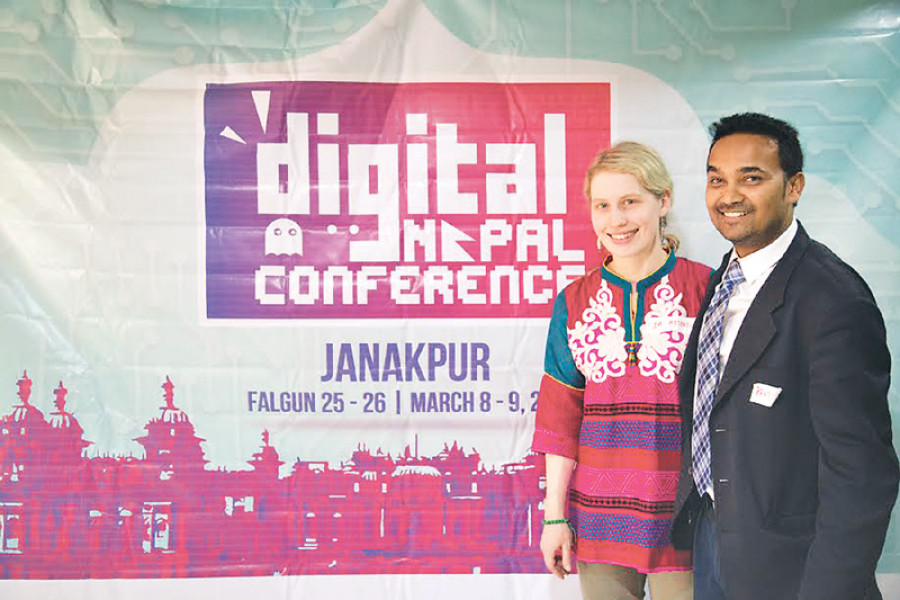Opinion
Leading by example
In the southern plains of the Tarai that run along Nepal’s border with northern India, a lack of economic opportunity and fulfilment through work often drives the youth elsewhere to pursue their dreams.
David Caprara
In the southern plains of the Tarai that run along Nepal’s border with northern India, a lack of economic opportunity and fulfilment through work often drives the youth elsewhere to pursue their dreams. Those who do make it out and achieve success rarely take their gains and put them back into the place from where they originated. This is a problem that Ravi Kumar has sought to tackle. Though a great deal of work went into planning his wedding last week, even more time went into planning the launch of a digital literacy initiative a day before it.
Durable impact
Ravi, 29, grew up in Janakpur, where unemployment levels are high and opportunities for learning digital skills scarce. In some areas in the Tarai, such as Dhanusa, up to two out of every three households have someone working abroad, usually as physical labourers in the Gulf states.
“My house was literally in a swamp,” Ravi recalls. “I had to walk through snake-infested standing water every day on my way to primary school. Once I was bitten and nearly died.”
Ravi made it out of the swamp alive, and after high school he left for the USA to study at Buena Vista University. He later moved on to the Columbia University Graduate School of Journalism. Ravi met his wife Mia, 28, in Washington, where he now lives and works. They decided to hold their wedding in Ravi’s hometown. This decision brought to the table an unshakeable feeling that they should make their wedding about more than themselves.
“In Nepal and other South Asian countries, weddings are usually taken as a chance for ostentatious displays of wealth,” Ravi explains. “Dowries are large and a lot of money is wasted. Mia and I wanted to help break this trend with our wedding; we wanted to contribute the money towards something that will have an impact more long-lasting than photos of ourselves to show off to family and friends.”
They agreed to establish a foundation with the aim to spread digital literacy across Nepal. Their non-profit initiative, Code for Nepal, would help provide communities with free training to learn digitals skills. These skills are a necessity for advancing in the 21st century workforce. Instead of having a wedding registry, Ravi and Mia decided to ask friends and family for donations towards their non-profit to jumpstart the project.
“We are happy that we can help contribute to something that is larger than ourselves,” said Mia. “Education in Nepal is centred around Kathmandu,” explains Ravi. “Our goal is to provide opportunities for those who do not live in the city.”
Addressing brain drain
The Tarai is an area where the local population has been known to voice concerns over their lack of opportunities. As is true globally, lack of opportunity can increase chances of social unrest. However, constructive programmes for economic and personal growth will bring about a greater chance for balanced development and prosperity.
The digital literacy initiative was launched to provide such opportunities. The launch was in the form of a conference that brought together over 10 lecturers who were from various professional fields around the world. Locals packed the room to the brim and were engaged in an active discussion on how they could benefit their lives and careers. Speakers shared their thoughts on topics such as computer engineering, reporting for news outlets, women’s rights and international development.
The initiative aims to award 25 scholarships to women across the country over the course of a year. Aid will be provided from a pool of donations amounting to Rs250,000. A local non-profit will be given another Rs200,000 and support from Mozilla to recruit computer instructors. Laptops were also donated from the US as a contribution to this project.
Support has been encouraging. “Donations from friends and family made the logistics of running this initiative a lot smoother,” said Mia. “It was not easy to plan for both the launch of our foundation as well as our wedding,” admits Ravi. Projects such as these are aimed at enriching communities. Maintaining them requires a great deal of effort if they are to endure beyond a symbolic gathering. But Ravi says that he is up to the challenge. “Janakpur is just the beginning,” he explains. “We hope to launch further initiatives in places all over Nepal.”
“What this is really all about is addressing brain drain—this idea of people gaining personal success but cutting off their roots,” Ravi explains. “If we are fortunate enough to achieve success, we should strive to bring it back to the places where we came from so that others can have a chance.”
On Friday, Ravi and Mia were married. Family and friends from both Nepal and the US gathered to celebrate the union. The couple will soon leave Nepal and return to the US, but their work has just begun. Now they are faced with the challenge of continuing the initiative they established. Donations and support from organisations have helped make dreams a reality by bringing ideas to life. Once we muster the confidence to take the first step and lay the groundwork for a commendable cause, we have the power to inspire and elicit support.
“My dream is that I can give at least one child an opportunity that they wouldn’t have otherwise had. This opportunity could help them grow and become a leader,” said Ravi. “If at least one boy or girl goes on to create a project that will help this community flourish, I have achieved my goal.”
- Caprara is a reporter in the New York bureau of the Tokyo Shimbun




 9.12°C Kathmandu
9.12°C Kathmandu










